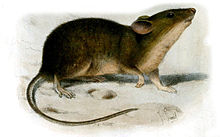The St Kilda house mouse (Mus musculus muralis) is an extinct subspecies of the house mouse found only on the islands of the St Kilda archipelago of northwest Scotland.[1] They were first described, alongside the St Kilda field mouse, by natural historian Gerald Edwin Hamilton Barrett-Hamilton in 1899.[2]
| St Kilda house mouse | |
|---|---|

| |
Extinct (c. 1930)
| |
| Scientific classification | |
| Domain: | Eukaryota |
| Kingdom: | Animalia |
| Phylum: | Chordata |
| Class: | Mammalia |
| Order: | Rodentia |
| Family: | Muridae |
| Genus: | Mus |
| Species: | |
| Subspecies: | †M. m. muralis
|
| Trinomial name | |
| †Mus musculus muralis Barrett-Hamilton, 1899
| |
Origin
editIt is uncertain when they first arrived on the islands, but it is possible that they were unwittingly transported there during the Norse period. Isolated on the islands, the St Kilda house mouse diverged from its relatives. It became larger than the mainland varieties, although it had a number of traits in common with a subspecies found on Mykines in the Faroe Islands, Mus musculus mykinessiensis.[3]
Extinction
editWhen the last St Kildans were evacuated in 1930, the endemic house mouse became extinct very quickly,[4] as it was associated strictly with human settlement. Some specimens exist in museums. The St Kilda field mouse (Apodemus sylvaticus hirtensis), a subspecies of the wood mouse, is still present.
References
edit- ^ Barrett-Hamilton, GEH (1899). "On the Species of the Genus Mus inhabiting St. Kilda". Proceedings of the Zoological Society of London: 77–88.
- ^ "Specimen of the week 339: The St Kilda mice | UCL Museums & Collections Blog". blogs.ucl.ac.uk. Retrieved 8 October 2019.
- ^ "The mammals on Mykines". Archived from the original on 3 March 2016. Retrieved 27 June 2007.
- ^ People and nature on St Kilda
Sources
edit- Harrisson, T. H. and J. A. Moy-Thomas. 1933. "The Mice of St Kilda, with Especial Reference to Their Prospects of Extinction and Present Status". Journal of Animal Ecology, 2: 109–115.
- Musser, G. G. and M. D. Carleton. 2005. "Superfamily Muroidea". pp. 894–1531 in Mammal Species of the World a Taxonomic and Geographic Reference. D. E. Wilson and D. M. Reeder eds. Johns Hopkins University Press, Baltimore.
External links
edit- St Kilda Mice and Wrens Archived 27 September 2007 at the Wayback Machine